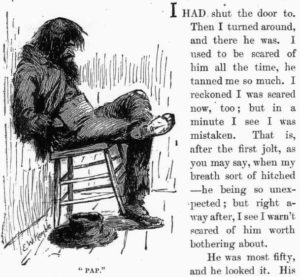 Huckleberry Finn’s father is such a towering, terrifying figure of American literature, it’s a wonder no one’s ever built a drama around him. Maybe we should put together a one-man show. “Pap Finn Tonight!”
Huckleberry Finn’s father is such a towering, terrifying figure of American literature, it’s a wonder no one’s ever built a drama around him. Maybe we should put together a one-man show. “Pap Finn Tonight!”
Like that “Mark Twain Tonight!” entertainment that Hal Holbrook wrote when he was at Denison University in the 1940s…and then kept revising and reviving to moderately amused audiences…for the next seventy years. That is, until 2017, when he was 92, and decided to take a rest and focus on more serious dramatic roles. “Mark Twain Tonight!” had begun as a jokey college project, but over the decades it turned into a tidy nest egg. We all remember Hal Holbrook from TV shows and movies from recent decades. The Firm, 1993, with Tom Cruise, is what always comes to my mind. But actually Hal’s career didn’t take off big time till he was, like, 45. Or maybe 50, when he played Deep Throat in All the President’s Men, 1976.
But in the meantime he kept doing his Mark Twain thing. “Mark Twain Tonight!” was a honey of a property because it required no supporting cast, practically no props, and no rights-clearance at all. All Hal Holbrook had to do was edit and recite stuff that the great man himself had scripted for endless lecture tours in the 1890s and 1900s. Seems Twain had gone bankrupt from numerous crazy schemes, and needed to make his fortune back.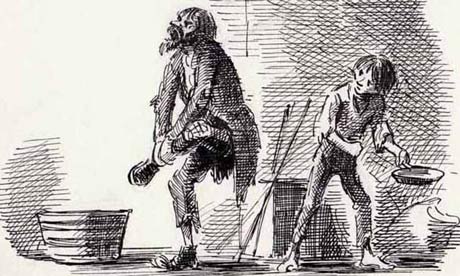
All this was on my mind many years ago when I was with a comedy troupe in the 80s, and actually did write a piece called “Pap Finn Tonight!” This was just a five-minute skit, an obvious takeoff on Hal Holbrook, though slightly edgier. I seem to have conceived it around the time that Vanessa Williams, our first black Miss America, was shamed out of her crown when Penthouse ran some old nudies of her. So Vanessa Williams was on the cover of People magazine, around mid-1984. And in my conception, this magazine is what sets old Pap off. He picks it up and waves it around, and does some drunken raving based on his actual rant in the Huckleberry Finn book, when he’s taken Huck to the cabin and he’s all whiskey’d up. Something like:
They call this a govment? Oh this is a wonderful govment, wonderful. What’s this nigger doin’ on a magazine cover? Oh they say she’s a free nigger. So free she sells naked pitchers of herself. What’s the country a-coming to? I know about these free niggers. One o’ them wouldn’t-a give me the road if I hadn’t shoved him out of the way. I says to the people, why ain’t this nigger wench put up at auction and sold? They call that a govment?
At this point the audience should be really alarmed and intrigued by Pap. So now the “Stage Manager” comes out, he’s dressed in a black suit and a top hat like the Mute in The Fantasticks, and he stage-whispers to Pap that it’s time get off. Pap berates him the way he berates Huck:
Why ain’t you a sweet-scented dandy? You got top hat, clean suit. I never seen such a son. Why, there ain’t no end to your airs. I’ll take some o’ these frills out o’ you before I’m done with you. I’m a-standing about all I can stand now. So don’t gimme so sass…
During this last bit of monologue, the Stage Manager has gone to get his crook. He hooks Pap around the neck and hauls him off the stage as Pap continues to rant. Exeunt.
As a very short, broadly comedic number, the skit bears some similarity to the “Royal Nonesuch” entertainment we read later on in Huckleberry Finn. That’s when the old bald guy with the white beard—the “King,” the one who claims to be the Dauphin of France—paints himself in multicolored spots and stripes, and for a minute or so cavorts naked on all fours before an audience of Arkansas yokels, who think they’ve come to see a grand theatrical offering from Edmund Kean. (I could tell you what happens next, but that might be a spoiler.)
So “Pap Finn Tonight!” was never produced, alas. Because—well, just because. When we did our Sunday afternoon script readings, jaws dropped. I think my colleagues missed the humor mainly because they just didn’t know Adventures of Huckleberry Finn. They couldn’t relate to its manic outrageousness. Back around 1980 SCTV did skits about poor, starving Okies in the Depression, and they were entirely based on the film version of the The Grapes of Wrath. They were hilarious if you knew the source material, but mean and mystifying if you didn’t.
My “Pap Finn Tonight!” has had a long afterlife in memory. One of our company, who decades later would win an Emmy Award for writing a politically correct comedy show about two colored guys, would laughingly complain to me: “Every time I move, every time I have to go through all the scripts we have—there it is, staring at me, right on top of the pile! ‘Pap Finn Tonight!'”
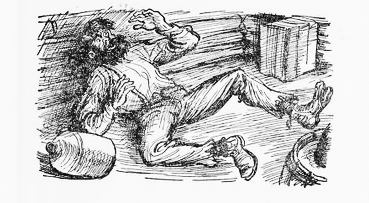
Ironically I myself haven’t had a copy of the script for many years. I was just improvising up above. In the course of a half-dozen transcontinental and trans-Atlantic moves, most of my juvenilia went up the spout.
In my old troupe—which shall remain nameless because a lot of these people still have careers and families—I not only wrote scripts, I was a performer and I built props. We performed in downstairs- and upstairs-cabarets in Manhattan. Sometimes on TV. Our live sketches were interspersed with video segments, because a lot of our work was simply not feasible on a live stage late at night. For instance, we might have a big number set at an amusement park, and we needed a genuine roller-coaster in the background. Well you just can’t build that on the stage at the West Bank Café on West 42nd Street (a favorite venue, where our compère was the young and ever-pissed-off Lewis Black). So we put televisions on the side of the stage to show the video skits. It was professional quality video, because one of our number ran the A/V department at AT&T. I’m giving you all these details in case you ever want to run a comedy cabaret yourself.
I was particularly fond of my “Chitty Chitty Bang Bang” sketch, which was all-video. This had a car-front prop I built out of posterboard and acrylic paints. The premise here was that Ian Fleming’s famous kiddie book was also his greatest James Bond story. In one scene (I recently came across it, I think on YouTube) we have the 007 character in bed post coitum, smoking a cigarette, asking Chitty in a Sean Connery voice, “Was it goood for yoou?”
I pushed the envelope whenever I could, and so my scripts were often shot down as too risky and offensive. For example, “Tard School,” a script for live performance. This was a takeoff on Dale Carnegie courses, which teach nervous losers how to present themselves smoothly and make themselves likable. Maybe even “Make Friends and Influence People,” as the saying goes. I was attuned to such things because I had no social graces whatsoever, and nearly signed up with Dale Carnegie. But I had this theory that most retards were like the rest of us. And so, instead of teaching them to make brooms or whatever, we should teach them to recite a script, put up a big front—present themselves as outgoing, friendly, articulate people. “Hey, I’m glad I’m here, I’m glad you’re here!”
I still believe this was a brilliant idea, and should be implemented in the teaching of the mentally retarded. Life is mostly an act, after all. Sincerity is something you fake. I grew up near a posh boarding school for the retarded, the Devereux Foundation, and we often used their grounds and buildings for parish barbecues and scouting events. We’d occasionally run into some of the inmates, or students, or whatever we called them. Mostly from rich, often celebrity families. They weren’t all that feebleminded or helpless. They were just inept. Maybe a bit spastic, perhaps autistic, though we didn’t know about autism then. What these kids (some of whom looked to be 23) really needed was the Dale Carnegie touch. And that was the moral of “Tard School.”
Nevertheless “Tard School” frightened the pants off a couple of our folks—specifically, the one-and-a-half Jews in our company. This surprised me, because I’d have expected such folks to dig its offbeat wackiness, and the faux humanitarianism that “Tard School” espoused. But that’s asking for too much. They problem was simply that my script was about…retards. They’d apparently received some ukase from the Community Relations boys, telling them never to mention the feebleminded in a humorous context. So even in the mid-80s, certain subjects were being declared verboten. The fact that I’d probably had more experience with retards than most of my colleagues wouldn’t really carry any weight, so I didn’t argue the matter.
* * *
When I was little, a cousin of mine was given a boxed set of Tom Sawyer and Huckleberry Finn, a lavishly illustrated (by Donald McKay) pair of editions that Grosset & Dunlap originally brought out in the 1940s. I think Book of the Month Club was giving them out as a subscriber bonuses around 1960. Anyway, said cousin received the books from his grandparents, who later asked if he enjoyed them. Always eager to please, he responded that he particularly enjoyed Huckleberry Finn because Pap Finn would get drunk and beat up Huck…just like his own father beat him up!
I believe this was an accurate description—the parent did indeed say things like, “I never seen such a son,” though presumably with better grammar. But it must have caused a lot of embarrassment and further abuse in that family. Confusion, too, because this drunken father would completely black out on what he said or did and honestly had no memory of it.
My cousin was seven years old at the time. His father had read Huckleberry Finn when he wasn’t much older. So the character of Pap Finn had embedded, insinuated itself into the father’s mind, way back in 1929, and it came out spontaneously when he was intoxicated and encountered his little son.
“Why ain’t you a sweet-scented dandy?”—there were remarks like that too. This was not a family tradition; they didn’t all go around channeling Pap Finn, swilling rye and beating each other up. The abuser’s father was in fact a very gentle, if somewhat remote, corporate executive and engineer. It’s not true that abusers were all abused as kids. Abusers might abuse just because they can.
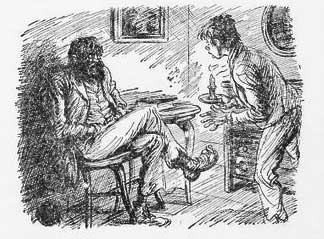
Was Pap Finn a role model for child abusers? It sounds absurd. He’s such a terrible loser, drunk and dirty and determined to grab the fortune that his son somehow lucked into. (Huck owns $6000 in gold, 1839 dollars, because of treasure he discovered with Tom Sawyer in the first book.) But strange things can come out when people have a load on.
A question that’s easier to answer is where the hell Pap Finn came from. If he was 50 years old in 1839, then he was born about 1789. One somehow doubts this birth was in Philadelphia, Baltimore or Boston; and Missouri would be highly unlikely, as it wasn’t even a state until 1820. Pap was most likely born in a western territory, perhaps along the Ohio River in the future states of Ohio, Indiana or Kentucky. And how did he come to be in a small river town in Missouri? (“St. Petersburg” in these books, presumably based on Twain’s hometown of Hannibal.) Was there a billet for Town Drunk that Pap decided to apply for?
No, the likely answer is that Pap is just an old Kaintuck. A onetime boatman from the flatboat days, before steamboats came to dominate Mississippi travel in the 1820s and 30s. Goods traveled down from the Ohio and Mississippi rivers via flatboats. The boatmen got to Natchez, or New Orleans (after Louisiana was part of the Union), sold their goods, and then pretty much had to walk back north via the Natchez Trace, through Mississippi and Tennessee. Pre-1820 these boatmen largely came from Kentucky, hence they were all called Kaintucks. If Huck was 14 (my estimate) in 1839, then he was born about 1825, right about the time that the flatboat-sailors were being phased out in favor of the new steamboat trade.
Pap most likely washed up on the Missouri waterfront in the 1820s. Presumably he married, and worked odd jobs till he was just too sorry and drunken and unemployable. Mark Twain, Samuel Clemens would have seen such people in riverfront towns when he was growing up.
Huck’s mother died somewhere along the line, probably when Huck was very young, as neither Huck nor Pap make mention of her. Then Pap went away, following the promise of a job, a few years before Adventures of Huckleberry Finn begins. Then he heard rumors that his abandoned son came into a fortune, and so Pap comes right back to St. Petersburg.
And that’s his story, near as I can make out. Pap Finn Tonight!

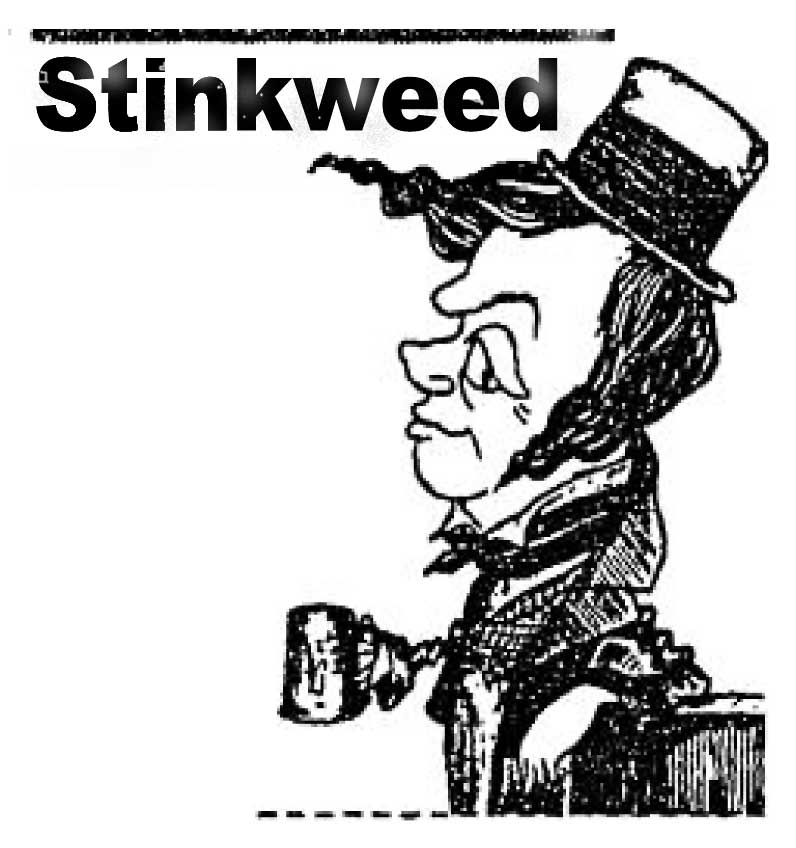

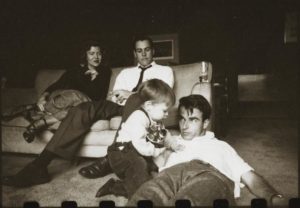


Facebook Comments